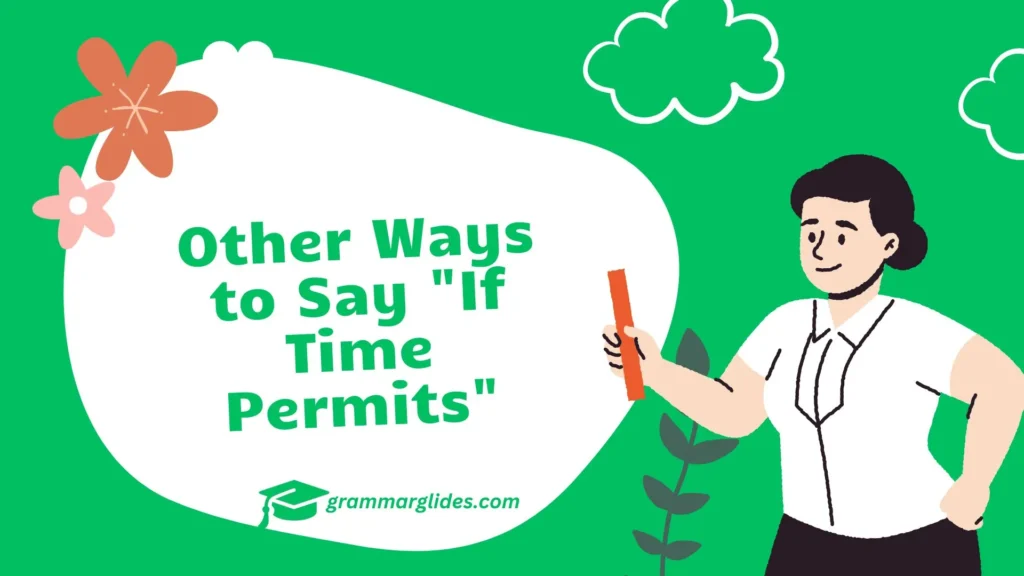“Alternative phrases to express “if time permits” can help convey flexibility and politeness in conversations.”
When we’re trying to arrange plans or make commitments, we often find ourselves using the phrase “if time permits.” While this is a useful expression, it’s always good to have other ways to communicate the same idea, especially in different contexts. Whether you’re in a formal setting at work or casually chatting with friends, having multiple phrases on hand can help ensure that you sound polite, considerate, and adaptable.
In various situations, it’s important to express that you’re open to possibilities, but that time might limit your ability to fully commit. Using alternatives to “if time permits” allows you to keep conversations smooth and respectful, while still showing that you’re willing to be flexible and accommodating. These phrases are not only versatile but also provide subtle variations in tone, from more formal to relaxed expressions.
By diversifying your vocabulary, you can communicate more effectively and sound more natural in your interactions. In this article, we’ll explore 30 alternative ways to say “if time permits,” offering you new ways to express flexibility and understanding in different situations.
Other Ways to Say “If Time Permits”
1. “If there’s time available”
Scenario: Asking a colleague to join a meeting later in the day.
Example 1: “We can discuss it further if there’s time available.”
Example 2: “I’d love for you to join if there’s time available.”
Explanation: This expression focuses on the availability of time, making it sound natural and polite in both professional and casual settings.
2. “If it’s possible”
Scenario: Telling a friend you might meet up later.
Example 1: “I’ll catch up with you later if it’s possible.”
Example 2: “We can chat after the meeting if it’s possible.”
Explanation: A straightforward and flexible phrase, often used when you’re uncertain about whether you’ll have time.
3. “If the schedule allows”
Scenario: Offering to help someone if you finish your task early.
Example 1: “I’ll help you with that if the schedule allows.”
Example 2: “We can meet for lunch if the schedule allows.”
Explanation: This is more formal and can be used in professional environments to express your availability based on your schedule.
4. “If there’s room in the day”
Scenario: Mentioning a possible extra task you can do if time allows.
Example 1: “I’ll take care of that if there’s room in the day.”
Example 2: “We can fit that in if there’s room in the day.”
Explanation: This phrase suggests that you’re flexible, willing to adjust your plans, and accommodating if time permits.
5. “If things go according to plan”
Scenario: Explaining that you might help with additional tasks if everything goes as expected.
Example 1: “If things go according to plan, I’ll be able to help you out.”
Example 2: “We can proceed with that if things go according to plan.”
Explanation: This expression indicates that the task depends on how smoothly everything progresses.
6. “If the timing works out”

Scenario: Telling a colleague that you might join a meeting later in the day.
Example 1: “I’ll attend if the timing works out.”
Example 2: “We’ll reschedule if the timing works out.”
Explanation: This phrase implies that you’re open to the idea of participating, depending on how things line up in your schedule.
7. “If there’s enough time”
Scenario: Explaining to a friend that you might hang out later if you’re not busy.
Example 1: “I’ll come by if there’s enough time after my meeting.”
Example 2: “We can catch up if there’s enough time in the afternoon.”
Explanation: This phrase suggests that your participation is contingent on having sufficient time, which is a more flexible and casual way of saying “if time permits.”
8. “If I get a chance”
Scenario: Letting a colleague know you might take a look at a project if you’re able to.
Example 1: “I’ll review this if I get a chance later today.”
Example 2: “I’ll check in if I get a chance this afternoon.”
Explanation: This expression indicates that you are willing to do something but can’t guarantee it, as it depends on finding time.
9. “If it’s convenient”
Scenario: Asking someone to meet if it works for them.
Example 1: “We can meet up later if it’s convenient for you.”
Example 2: “I’ll join you if it’s convenient for both of us.”
Explanation: A polite and formal way to suggest that something depends on the convenience of all parties involved.
10. “If I have a moment”
Scenario: Offering to help a friend when you’re free.
Example 1: “I’ll assist you with that if I have a moment later.”
Example 2: “We can discuss it if I have a moment after work.”
Explanation: This phrase is casual and suggests that you’re open to doing something if you find the time.
11. “If it’s feasible”
Scenario: Explaining that your participation depends on whether it’s possible.
Example 1: “I’ll join the call if it’s feasible for me.”
Example 2: “We can schedule the meeting if it’s feasible for you.”
Explanation: This phrase is polite and professional, often used when you’re not certain about the possibility of fitting something in.
12. “If there’s availability”
Scenario: Asking if someone has time for a quick chat.
Example 1: “I’ll stop by if there’s availability in your schedule.”
Example 2: “We can talk later if there’s availability for a meeting.”
Explanation: This expression emphasizes the availability of time and can be used in both formal and casual situations.
13. “If circumstances allow”
Scenario: Explaining that you’ll participate only if things align.
Example 1: “I’ll be there if circumstances allow.”
Example 2: “We can proceed with the plan if circumstances allow.”
Explanation: This phrase is a more formal way to express that you are uncertain about being available due to other factors.
14. “If there’s enough room”
Scenario: Telling a friend you might join a dinner if there’s space.
Example 1: “I’ll join if there’s enough room at the table.”
Example 2: “We can take on another task if there’s enough room in the schedule.”
Explanation: This suggests that you’re open to an invitation or task if space in your schedule allows.
Other Ways to Say “It Suits You”
15. “If I can fit it in”
Scenario: Explaining that you’ll attend an event if you’re able to manage your time.
Example 1: “I’ll try to fit it in if I can manage the timing.”
Example 2: “We can meet up if I can fit it in later today.”
Explanation: This phrase is casual and indicates you’re trying to balance your time but aren’t sure if you’ll be able to.
16. “If it’s not too much trouble”
Scenario: Offering to help someone if it doesn’t cause inconvenience.
Example 1: “I’ll help you with that if it’s not too much trouble.”
Example 2: “We can reschedule if it’s not too much trouble for you.”
Explanation: This phrase softens the request, making it sound polite and considerate while expressing that you might need to decline depending on your time.
17. “If all goes well”
Scenario: Saying you’ll attend an event if nothing interferes.
Example 1: “I’ll be there if all goes well with my schedule.”
Example 2: “We can go ahead if all goes well with the plans.”
Explanation: This phrase emphasizes that your availability is subject to how things go and whether any unforeseen circumstances arise.
18. “If I manage to free up some time”
Scenario: Letting someone know that you might be able to attend if you find time.
Example 1: “I’ll come if I manage to free up some time this evening.”
Example 2: “We can meet if I manage to free up some time later.”
Explanation: This is a flexible and casual way of saying that you’re open to an invitation if you’re able to clear your schedule.
19. “If there’s time left”
Scenario: Mentioning the possibility of meeting after a meeting finishes.
Example 1: “We can meet if there’s time left after the presentation.”
Example 2: “I’ll chat with you if there’s time left in the day.”
Explanation: A straightforward phrase that indicates you’re available only if time is remaining.
20. “If I have time to spare”
Scenario: Telling a friend you’ll attend if you have extra time.
Example 1: “I’ll join you if I have time to spare later.”
Example 2: “We can talk if I have time to spare before my meeting.”
Explanation: This phrase conveys that you’re willing to participate if you have free time.
21. “If time permits itself”
Scenario: Offering to join a colleague’s after-work event if you’re not busy.
Example 1: “I’ll attend if time permits itself after the meeting.”
Example 2: “We can talk later if time permits itself.”
Explanation: This phrase is a slightly formal way of indicating that time availability is conditional on how your day unfolds.
22. “If it works out”
Scenario: Saying you might go for coffee if your other plans go smoothly.
Example 1: “We can grab coffee if it works out for both of us.”
Example 2: “I’ll stop by if it works out in my schedule.”
Explanation: A casual and easy-going expression, implying you’re flexible but not fully committed.
23. “If the stars align”
Scenario: Suggesting you may attend a party if other factors fall into place.
Example 1: “I’ll be there if the stars align with my schedule.”
Example 2: “We can go if the stars align for us.”
Explanation: A more whimsical and lighthearted way to express that your participation is contingent on perfect timing.
24. “If the opportunity arises”
Scenario: Telling someone you might help if an opportunity presents itself.
Example 1: “I’ll assist if the opportunity arises.”
Example 2: “We can meet if the opportunity arises later.”
Explanation: This phrase suggests that your action depends on circumstances presenting themselves.
25. “If it’s in the cards”

Scenario: Explaining that you’ll help if everything aligns with your schedule.
Example 1: “I’ll join the meeting if it’s in the cards for me.”
Example 2: “We can talk about it if it’s in the cards today.”
Explanation: A casual, somewhat playful way to indicate that you may be available if it’s meant to happen.
26. “If time permits me”
Scenario: Offering to attend an event if your time allows it.
Example 1: “I’ll attend the event if time permits me later.”
Example 2: “We can meet if time permits me after work.”
Explanation: A simple and polite way of expressing conditional availability.
27. “If I can make time”
Scenario: Telling someone you’ll help if you’re able to adjust your schedule.
Example 1: “I’ll try to make time if I can manage my tasks.”
Example 2: “We can talk if I can make time after the meeting.”
Explanation: This phrase indicates that you’re willing to prioritize something if you’re able to find the time.
28. “If things work out”
Scenario: Letting a friend know you might be able to join their party if nothing changes.
Example 1: “I’ll come if things work out with my schedule.”
Example 2: “We can go if things work out as planned.”
Explanation: This implies that you’re open to something happening if the circumstances align.
29. “If it’s possible on my end”
Scenario: Telling someone you may attend their event if it’s possible within your schedule.
Example 1: “I’ll be there if it’s possible on my end.”
Example 2: “We can meet if it’s possible on my end today.”
Explanation: This phrase adds a personal touch, suggesting the flexibility is dependent on your situation.
30. “If all falls into place”
Scenario: Mentioning that you may join an event if everything fits into your schedule.
Example 1: “I’ll be there if all falls into place.”
Example 2: “We can meet if all falls into place later.”
Explanation: A relaxed and hopeful expression that you’re open to something happening if the timing works out.
Why is it important to have different ways to say “if time permits”?
Having alternative expressions allows for flexibility in communication. It helps convey politeness, ensures clarity, and adapts your tone to different situations—whether formal, casual, or professional. It also prevents the repetitive use of the same phrases and adds variety to your language.
FAQs
1. When should I use “if time permits” instead of other expressions?
You can use “if time permits” in more formal situations, such as at work or when scheduling events with colleagues.
2. Can “if time permits” be replaced by a casual phrase with friends?
Yes, expressions like “if I have time to spare” or “if there’s room in the day” work better in casual conversations.
3. Is “if it’s possible” a good replacement for “if time permits”?
Yes, this phrase works well when you want to express that something can happen only if circumstances allow.
4. Is “if the schedule allows” a formal way to say “if time permits”?
Yes, it is typically used in professional settings and adds a more structured tone to the conversation.
5. Can these phrases be used in business emails?
Yes, phrases like “if the schedule allows” or “if time permits” are suitable for business emails when you’re confirming availability or extending flexibility.
Conclusion
Incorporating a variety of phrases to express “if time permits” can make your communication sound more natural and adaptable.
Whether you’re in a professional setting or a casual conversation, the alternatives listed here offer flexibility and politeness, ensuring your message is clear without sounding repetitive. By using these alternatives, you can convey your openness to help, join, or participate, while also respecting your own time limitations.

Hi! I’m Zadie-Smith, the author of Grammar Glides. I create easy-to-follow resources to help you master English grammar with confidence. Join me on my website for tips and tools to make your English learning journey smooth and enjoyable!

